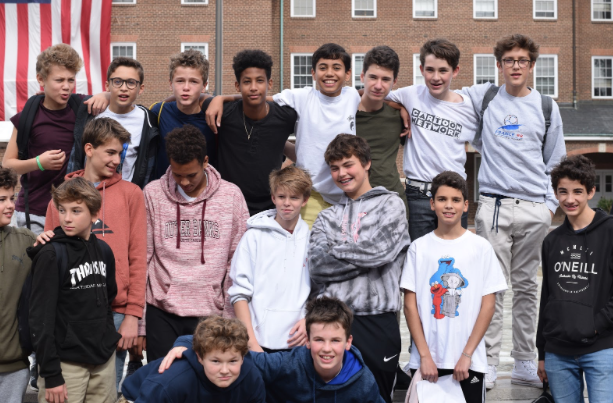What am I going to do with my correspondent? What if they hate me? What if I’m boring? What if I lose them? These are all questions that rushed through my head after hearing that my correspondent was arriving in a month. I had no idea what I was going to do with them or even say to them. But fear not, future hosts, I have a guide for you. I went around interviewing a lot of the current French eighth-graders coming from their school in Paris, College Sevigne on what they did and how it worked out, all for you. Remember that everyone has a different personality, so you might have to be creative and think outside the box on how to draw your correspondent out of their shell.
What to say to them?
This is so important because it is how you start to bond with them. If my correspondent and I sat around staring at each other like a bunch of googly eyes, it would have been extremely awkward and we would never have started talking. Talking to your correspondent really depends on if they are introverted or extroverted. In the words of Marjorie Rohan-Dobson, “We just started talking and our personalities just clicked I guess. We had already asked a lot of questions before [she came]. We mainly talked about our social lives.” This clearly worked because Marjorie and her correspondent, Sarah, are as close as ever. They text twice a week to check in with each other and to remain as close as they were while Sarah was here.
Sophia Rees worked on making a nice environment for her correspondent to live in. “I made sure she felt comfortable. I told her I was always next door and after school [I] made sure to take her everywhere I went so she didn’t feel alone.” After all of my interviews, I have come to the conclusion that the best thing to do when you don’t know what to say is to ask a question that would lead to conversation. Asking a yes or no question brings that conversation to a halt, therefore you should ask questions that have a more elaborate answers. Even if you have nothing to talk about, try and come up with something, even if it’s as boring as: what is the weather like in Paris this time of year?
What to do with them?
The goal of this correspondent program it to give these Parisians a true American experience and that is what the majority of this eighth grade class aimed to do. Sophia Rees and Emma Metzner opted to feed their correspondents American food, and even take them to SoulCycle, which they loved. When asked what they did with their correspondents, they said, “Getting Johnny Rockets. It was so American, so obviously delicious!.” Nina Young went grocery shopping with Ines, her correspondent. They stocked up on Peeps, Cheez-Its, Lucky Charms and Oreos, adding to the American stereotypes about sugar and diabetes.
While junk food is truly American, so is basketball. A Wizards game is the perfect place to take your correspondent. More junk food, American sports and the smell of an National Basketball Association (NBA) gym! This was a huge hit with all of the correspondents that went, and it will most likely be fun for you too. As stated by Sophia Rees “We got free shirts and my correspondent grabbed ten of them so she could have souvenirs for her family!” But doing something easy and simple is also really effective. A lot of hosts watched American movies with their correspondents. This is a good way to help them improve their English, do something entertaining and not stressing about having to talk. Some movie suggestions include “Ferris Bueller’s Day Off”, “Grease”, “Mean Girl”s and more movies along those lines.
How do we really feel?
While this is a guide to hosting a Parisian correspondent, I also wanted to give you an inside scoop on what the class of 2023’s challenges were with their correspondents and what we would do to improve the correspondent program. Now, I have my own personal opinions, but instead of sharing those with you, I asked around. My first question addressed the challenges of having a correspondent. One student said, “They’re not here for long enough. You don’t really get to like bond with them that much because we don’t do that much with the other ones. The other correspondents.” A lot of people’s challenges included not doing enough with all the correspondents. When your correspondent is with their friends, it really helps them open up because they are not alone.
Other challenges included “Taking them wherever I need to go like swimming.” and “You kind of forget that you are with someone else and then you remember and it’s kind of awkward. [Plus] My friends correspondents aren’t friends with mine.” For the first challenge, taking them everywhere, it can be interesting for your correspondent to watch you do something, like swimming. But if you really think that they would get bored to death, arranging for them to hang out at your friend’s house is also a solution, especially if your friend’s correspondent is their friend. The best thing to do when you forget about your correspondent when you’re having a separate conversation is bringing your Parisian into the convo. No one likes to feel left out, especially not someone who is living in a strange country with someone they don’t know that well.
When asked how the correspondent program could be better, one person responded with “I think it can be improved by like actually matching them well.” Another student’s challenge included a fairly large age and maturity gap. “Not [pairing a] twelve year old for a fourteen year old.” As I mentioned before, being with a lot of your friends and your correspondent’s friend is a great way to loosen up. Some of the correspondents this year didn’t end up matching very well because of the difference in personalities. Paring two introverts together, usually results in no one talking to each other. However, even if this happens to you, making an effort to become friends with your correspondent will not only make the trip to Paris less awkward, you will be making a new friend along the way.
Despite these misfortunes, this years Parisian correspondents from College Sevigné were a joy to host and we were all very sad when they left for home on November Eighth. I know I’m excited for our trip to Paris in March and while there could be some problems with our correspondents in the future, this trip will be fun educationally, at least. I would also like to thank M. Delair, Mme. Saady, Mme. Esparcel, Mme. Langrognet, Mr. Beck and Mr. Althaus for organizing the correspondent program.
Abigail Bown



































































